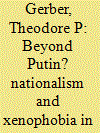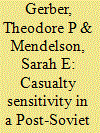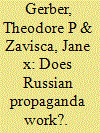|
|
|
Sort Order |
|
|
|
Items / Page
|
|
|
|
|
|
|
| Srl | Item |
| 1 |
ID:
142994


|
|
|
|
|
| Summary/Abstract |
The role of nationalism within the Russian public is an under-examined but potentially important aspect of the crisis surrounding Russia's annexation of Crimea and its continuing involvement in eastern and southern regions of Ukraine. As commentators have sought to comprehend President Vladimir Putin's motives, many have asserted or assumed that such actions enjoy tremendous Russian public support. Indeed, public opinion polls from Russia indicate that Putin's popularity soared in the wake of the Crimean annexation and that large majorities have supported the government's policies in Ukraine, sympathizing with the Kremlin's negative portrayals of U.S. motives and actions.1 However, it is not clear whether this wave of public support is a fleeting “rally around the flag” phenomenon or the result of an organic, deeper tendency toward nationalism and xenophobia in the Russian public.
|
|
|
|
|
|
|
|
|
|
|
|
|
|
|
|
| 2 |
ID:
082073


|
|
|
|
|
| Publication |
2008.
|
| Summary/Abstract |
Theodore P. Gerber and Sarah E. Mendelson analyze Russian public opinion about the second war in Chechnya. They show that concern over Russian military casualties and the war's economic costs were the dominant sentiments, despite the Russian government's monopoly on media coverage of the conflict. Moreover, they argue that the war appears to have fueled ethnic animosity toward Chechens
|
|
|
|
|
|
|
|
|
|
|
|
|
|
|
|
| 3 |
ID:
147223


|
|
|
|
|
| Summary/Abstract |
Since the onset of the Ukraine crisis, the Russian government has stepped up efforts to promote a narrative it first introduced in the mid-2000s regarding the faults of the United States and the West; the dangers of institutions associated with democracy, such as protests and NGOs; and the superiority of Russian values and institutions. This narrative comes from official statements, diffuses via government-orchestrated Russian mass media as well as innovations such as internet “troll farms,” and is directed at both domestic and international audiences. Domestically, the arguments seek to legitimize the Putin regime, garner support for its policies, and demonize its critics. Internationally, they are part of a larger effort to project Russian “soft power,” sow doubts and uncertainty within the NATO alliance, weaken public support for policies countering Russian aggression in Ukraine, and solidify the allegiances of Russia's allies in former Soviet republics whom Russia considers part of its natural sphere of influence.
|
|
|
|
|
|
|
|
|
|
|
|
|
|
|
|
| 4 |
ID:
068032


|
|
|
| 5 |
ID:
168562


|
|
|
|
|
| Summary/Abstract |
Powerful countries use foreign media broadcasts to enhance their soft power, yet there is scant empirical evidence as to whether such efforts actually sway public opinion abroad. Moreover, researchers have not specified conditions that may shape variations in the influence of foreign broadcasts and internet. We propose a theory that predicts, respectively, opinion-formation and issue-framing effects of foreign broadcasts as functions of the pervasiveness and familiarity of the issues they cover. We test our hypotheses by examining the potential effects of exposure to Russia-sourced broadcasts on views of Russia and other foreign policy issues in Kyrgyzstan, a most likely case of foreign media effects. Using an original, nationally representative survey conducted in Kyrgyzstan in 2015, we find that the influence of Russian media on Kyrgyzstani opinions varies according to the pervasiveness and familiarity of the issues at stake and is more limited than traditionally believed. The modest and conditional effects of foreign media in this particularly favorable environment cast doubt on the assumption that media are a soft-power tool “par excellence” and call for further research on how media can be used effectively for public diplomacy.
|
|
|
|
|
|
|
|
|
|
|
|
|
|
|
|
| 6 |
ID:
091068


|
|
|
|
|
| Publication |
2009.
|
| Summary/Abstract |
The global counterinsurgency strategy to combat terrorism emphasizes responding to the social and economic needs of communities where terrorists may find support. Public opinion data can help in that strategy, as shown by a 2006 survey of 1,200 young males from three provinces in Russia's North Caucasus. Conventional wisdom notwithstanding, the survey shows few signs of burgeoning radical Islam or ethnic animosity. Instead, economic conditions and poor governance are primary concerns. The region provides both an opportunity and threat: policymakers can and should address the region's needs; if not, radical Islamist groups can turn it into a flashpoint for terrorism.
|
|
|
|
|
|
|
|
|
|
|
|
|
|
|
|
| 7 |
ID:
186132


|
|
|
|
|
| Summary/Abstract |
Sino-phobia, which has reportedly grown internationally during the COVID-19 pandemic, is a potential obstacle to China’s economic and foreign policy initiatives involving Russia and Central Asia. After providing historical and theoretical context, the authors analyse publicly reported time-series data from Russia and original survey data from Russia and Kyrgyzstan to assess the extent of Sino-phobic attitudes and their associations with demographic, socioeconomic, and geographic variables. By also considering attitudes toward Americans and other national groups, the authors show that anti-Chinese sentiment, while high, does not exhibit especially pronounced tendencies. In Russia, nationalism and anti-immigrant sentiment are key correlates of Sino-phobia. Additional survey research is necessary to assess the impact of COVID-19 on Sino-phobia and determine whether it hinders China-friendly policies, as some observers have suggested.
|
|
|
|
|
|
|
|
|
|
|
|
|
|
|
|
| 8 |
ID:
067783


|
|
|
| 9 |
ID:
083408


|
|
|
|
|
| Publication |
2008.
|
| Summary/Abstract |
A narrow focus on Putin has overlooked an important political and social development inside Russia. A new, young generation now reflects his values, favoring restoring a hyper-sovereign Russia and resisting or rejecting international legal norms.
|
|
|
|
|
|
|
|
|
|
|
|
|
|
|
|
|
|
|
|
|